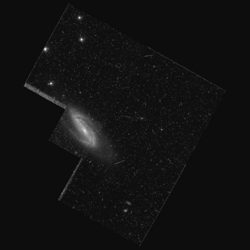| NGC 6394 | |
|---|---|
 NGC 6394 as seen through the Hubble Space Telescope | |
| Observation data (J2000 epoch) | |
| Constellation | Draco |
| Right ascension | 17h 30m 21.4s |
| Declination | +59° 38′ 24″ |
| Redshift | 0.028306±0.000064 |
| Heliocentric radial velocity | 8486±19 km/s |
| Galactocentric velocity | 8684±21 km/s |
| Distance | 390 million light years (119 million parsecs) |
| Apparent magnitude (V) | 13.416 +/- 0.002 |
| Absolute magnitude (V) | -21.94 +/- 0.50 |
| Characteristics | |
| Type | SBb |
| Size | 159,000 light years |
| Apparent size (V) | 1.40′ × 0.4′ |
| Other designations | |
| UGC 10889, MCG 10-25-55, ZWG 300.45, PGC 60410 and IRAS17296+5940 | |
References: NASA/IPAC extragalactic datatbase, http://spider.seds.org/ | |
NGC 6394 is a barred spiral galaxy located in the constellation Draco. It is designated as SBb in the galaxy morphological classification scheme and was discovered by the American astronomer Lewis A. Swift on 7 July 1885. [1] [2] [3]